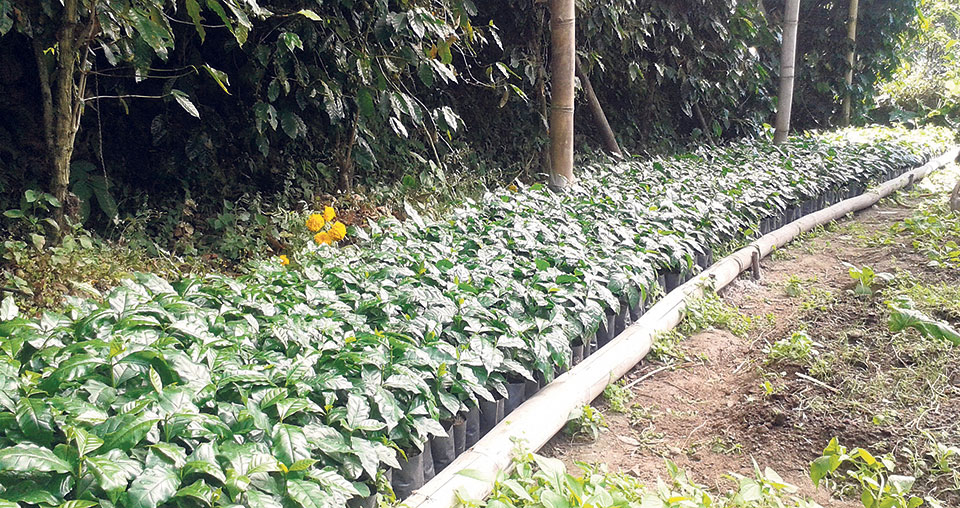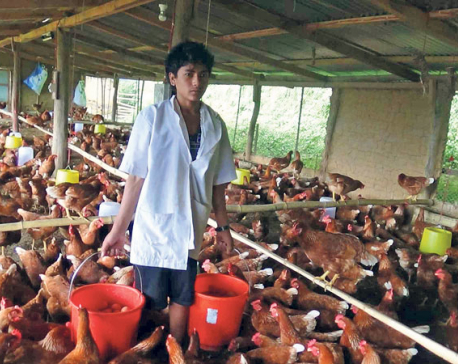
OR

KASKI, Nov 18: Though the area of coffee farming has increased, the production has not gone up much. Coffee is farmed in most of districts of the western region except the mountainous areas. However, the production of coffee has not risen as expected.
Farmers in Kaski, Syangja, Tanahu, Parbat, Gulmi, Baglung, Myagdi, Tanahu and Gorkha, among other districts, are commercially farming coffee. However, there has not been a significant rise in the production due to the lack of improvement in farming system, inability to control pest and insect attack, and lack of proper management, among other problems, according to Chandra Puri, an agricultural development officer at National Coffee Development Board’s regional office in Pokhara.
Except Rupandehi, Nawalparasi, Kapilvastu, Manang and Mustang, all other districts in the western region produce coffee. Puri said that these districts have seen expansion in the areas of coffee production in the current year compared to the last year.
Coffee is being cultivated in 625 hectares in 11 districts of the western region in this year, which is 100 hectares more than the last year.
However, the production is not enough to meet even 20 percent demand of this region, he said. In the last year, a total of 34 tons coffee was produced in Baglung, Kaski and Palpa districts alone. However, the production of coffee of these districts totals only 32 tons.
“Not only external factors but climate change, drought and other adverse environmental conditions also impacted the production of coffee in these districts,” said Puri. Other districts’ situation was also not so different, he added.
A disease named Sindure in the coffee plants led to nearly 20 percent decline of coffee production, Puri estimated. Insects named Seto Gabaro have also attacked coffee plants in districts like Gulmi, Palpa, Gorkha, Arghakhanchi, Parbat, Syangja and Kaski, among others, according to Puri. He said that many farmers were compelled to cut coffee plants due to this insect.
However, the board expects increased production in the next two years. According to the board officials, it has been holding trainings and distributing better plants to farmers, besides the fact that farmers are using modern technology, which is likely to increase production.
You May Like This

‘Coffee 2 Go Nepal’ brings mobile coffee stall in Kathmandu
KATHMANDU, April 2: So far, when you wanted to take a coffee-break, you needed to visit coffee shops and sometimes travel... Read More...

Coffee stakeholders rue lack of training for farmers
KATHMANDU, May 25: Coffee entrepreneurs claim that Nepali coffee industry is not growing as expected due to lack of training and... Read More...

Khotang goes self-relaint in eggs , meat production
KHOTANG, Oct 22: Khotang district used to rely heavily districts for supply of meat and eggs. But this is no more... Read More...




Just In
- Nepal-Qatar Relations: Prioritize promoting interests of Nepali migrant workers
- Health ministry to conduct ‘search and vaccinate’ campaign on May 13
- Indian customs releases trucks carrying Nepali tea, halted across Kakarbhitta
- Silent period for by-election to begin from midnight
- SC issues short-term interim order to govt and TU not to take immediate action against TU legal advisor Khanal
- National consultation workshop advocates to scale up nutrition smart community in Nepal
- Patan High Court issues short-term interim order to halt selection process of NTB’s CEO
- NEPSE inches up 0.15 points; daily turnover increases to Rs 2.53 billion













Leave A Comment